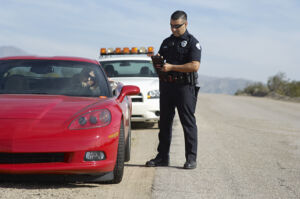Criminal Defense Attorney
 If you are driving and pulled over by the police, can they search your car without a warrant? The answer is yes, most likely they can. Here’s why:
If you are driving and pulled over by the police, can they search your car without a warrant? The answer is yes, most likely they can. Here’s why:
Generally, in the United States people have the right to privacy and to be free from unreasonable searches without a warrant. The Fourth Amendment of the United States Constitution prohibits the government from conducting searches on people or their things unless they first obtain a warrant. The warrant must be based on articulable probable cause and get approved by a judge or magistrate before it can be issued. Articulable probable cause means that the warrant must clearly describe exactly who or what is to be searched and identify the particular reasons why police believe there is evidence of a crime.
The Constitution, however, was written in 1787, well before cars were invented. As cars became more and more part of our everyday lives, law enforcement realized that people were using them to transport illegal items and commit crimes. During the prohibition era, specifically, police were interested in searching cars where they suspected people were smuggling alcohol. In response, the Supreme Court adopted what is commonly known as the “automobile exception” to the warrant requirement.
The Supreme Court held in Carroll v. United States (1925) 267 U.S. 132, that police can search cars without a warrant where they have (1) probable cause to believe evidence of a crime is inside and (2) there are exigent circumstances to believe the car would be removed from the area if they took time to go get a warrant from a judge or magistrate. This ruling became known as the Carroll Doctrine.
The Supreme Court distinguished cars from houses or people, finding that it is not practical to require police to secure a warrant before searching a car because cars—being mobile by definition—can be easily moved to a new location or jurisdiction. The Supreme Court reasoned that one has a lower expectation of privacy in their car. This is because the ease of moving a car creates an “inherent exigency” to allow warrantless searches and preserve the loss of evidence. For this reason, the automobile exception does not violate one’s Fourth Amendment right to privacy.
The Supreme Court further held in United States v. Ludwig (1993) 10 F.3d 1523, that police are not required to get a warrant even if the officer has time to obtain one. So long has they have probable cause to believe there is evidence of a crime within, and the car is capable of getting away, police can search your car without a warrant.
Under the automobile exception, police may search your entire car when they have probable cause to believe there is evidence of a crime within. This includes searching the trunk, glove compartment, containers within the vehicle, and the bodies of any passengers inside. The scope of their search, however, is not unlimited. Police may only search the areas where they have reason to believe there is evidence of the specific crime which gave rise to the probable cause to search in the first place. For example, if police have probable cause to search for a rifle, they may not use the automobile exception to search one’s purse, pockets, or small containers within the car. This is because those areas cannot physically contain a long gun.
Our friends at the Law Offices of David R. Silldorf, APC will tell you that if you are facing criminal charges and police searched your car without a warrant, you may have a legal defense if the search was unreasonable or beyond the scope for which there was probable cause to search. This is why it is important to contact an experienced criminal defense attorney to help identify possible defenses to the automobile exception to learn more about your rights in this type of a situation.


EXCELLENTTrustindex verifies that the original source of the review is Google. Justice was very informative & kind & went above & beyond for me in every way she could . I highly recommend this attorney!!!!Posted onTrustindex verifies that the original source of the review is Google. Had an initial consult with the paralegal this morning. She was so polite, and very helpful. Listened, took my info and made the process very easy, in an area where I have a tough time finding attorney's. Thank YouPosted onTrustindex verifies that the original source of the review is Google. Mrs Hall did a great job in helping me get the best outcome for my case. I highly recommend her services.Posted onTrustindex verifies that the original source of the review is Google. I was fortunate to receive help from Susannah and her team. Susannah is a highly knowledgeable expert in her field. Although my requests was relatively straightforward for such an experienced professional, Susannah and her team provided me with outstanding support and answered all of my questions. I recommend discussing your specific situation with Susannah—even if it feels stressful—because she is excellent at analyzing circumstances and presenting clear options and potential actions. I have no doubt that Susannah and her team have the expertise to provide the best insight and guidance in their field.Posted onTrustindex verifies that the original source of the review is Google. Process went smoothlyPosted onTrustindex verifies that the original source of the review is Google. Susannah Hall-Justice is an amazing attorney! She was on top of things every step of the way and I am very thankful for her!Posted onTrustindex verifies that the original source of the review is Google. I am currently a client of hers. I do get nervous going to court or just simply meeting with her as my lawyer because I never had to be in a situation that required me to need a lawyer! I feel safe with Ms. Hall-Justice because you can just tell she has your best interest! She listens, observes and make sure you are heard! I am praying to God I don’t have to look like what I’m going through because it’s stressful and I just want to go back to my regular life with my children!Posted onTrustindex verifies that the original source of the review is Google. This attorney is definitely a credit to her craft! She is very personable and never talks down to a client. She makes a person feel like he/she is actually part of what's going on. She negotiated with the prosecutor and i was offered EVERYTHING that I had hoped for and even more! I would definitely hire her again and i highly recommend that you hire her and trust her in what is often a very vulnerable and confusing time.Posted onTrustindex verifies that the original source of the review is Google. When we needed a Lafayette attorney to represent us for various charges, Susannah was all we could have hoped for. She had several charges dropped immediately and the remaining minor charges diverted for good behavior. After two months of good behavior, all charges were dismissed. Susannah and her assistant Erica were responsive, supportive and above all very effective. All at very reasonable rates. I have worked as a criminal defense lawyer in the past and I was very impressed.Posted onTrustindex verifies that the original source of the review is Google. Impressive and refreshing. I called Susannah’s office first thing in the morning to inquire about a minor legal service and left my contact information with her assistant. Susannah personally called me back only a short while later despite how busy she undoubtedly is. It turned out that the legal opinion I required had to be from a practicing attorney in a different state so we didn’t go forward. Still, the fact that she personally returned my call, and was genuinely pleasant and attentive, substantiates her very positive and personal reviews. Not to stray into the negative but what a breath of fresh air compared to most of the attorneys with whom I’ve spoken in this area - routinely terse, rude and bumptious. This (Hall-Justice) is the law office I will call first for any future legal needs. Thank you.




